- Home
- Robert Graysmith
The Laughing Gorilla: A True Story of Police Corruption and Murder Page 2
The Laughing Gorilla: A True Story of Police Corruption and Murder Read online
Page 2
Powerful locomotives were pushing and pulling Southern Pacific, Western Pacific, and Santa Fe boxcars to waterfront railroad yards to be joined to other freights. Boxcars on spurs of the Belt Railroad, a state-owned and operated railway, led out onto every pier so cargo could be loaded directly from the ships into boxcars. A Belt Line locomotive passed Dullea, wheezing mightily and trundling like a huge black beetle. Slowly, it nudged two refrigerator cars toward the Matson Line docks at Pier 30.
Dullea heard the cry of gulls and water lapping against timbers. All about him flashed the wide, unbroken expanse of the Bay—no Golden Gate or Bay Bridges. The iciness in the air had evaporated as suddenly as it had come. It was hot now. He knelt and dragged the point of a yellow pencil through an immense stain. The seepage had congealed enough to leave a definite trail. Once dry he would be hard pressed to judge its age. Already dry to his touch at the edges, it could have been paint, rust, or oil, but it wasn’t. The dried blood had begun to clot three to five minutes after being shed.
The blotch darkened under the blazing sun, each moment making it more difficult to differentiate it from older stains like grease and tar. Freshly spilled blood shines a glossy reddish brown, but its ultimate hue is always black. In the open air, the slight luster on its surface faded as Dullea watched. Automatically, he calculated by the change in color how long the blood had been there. “Three hours old,” he determined, though he already knew exactly when it had been shed—10:37 A.M. He was looking at drainage. A human life reduced to drainage! And that, he concluded sadly, was the origin of the lake of blood. In a few years, the Bay Bridge would pass like an awning over the loathsome stain and shroud it as effectively as this morning’s total eclipse.
Dullea averted his eyes. Normally, he didn’t know the victim. This time he did. So did the tough new police chief, William J. Quinn. So did hundreds of longshoremen along the crookedly smiling waterfront. The blood belonged to the most beloved patrolman on the Embarcadero, Officer John Wesley Malcolm, a thirty-two-year veteran. Big-eared and turkey-necked, this last of the old Barbary Coast beat cops had been “a friend to the downtrodden and an unrelenting enemy to the vicious and corrupt.” Dullea could still see his face, lined as a street map, creased by a broad smile, a snowdrift of white hair spilling from his cap.
At the northern edge of the lake of blood, where the concrete had been beaten down by the steel rims of carts and wheels of heavy trucks, a hob-nailed boot had tracked blood. Dullea followed its trail to a crowd of sullen men. All were potential witnesses—burly merchant sailors, stevedores, and longshoremen dressed in flat caps, denim shirts, and heavy black canvas pants. Every pair of Frisco pants had been patched, repatched, and re-stitched where they were ragged at the cuffs. Every shoe was worn, cracked, caulked, and resoled. From every back pocket hung a cargo hook for snagging rolls of hemp, grappling burlap bags, and settling disputes. Labor unrest festered in this foggy region of grimy waterfront hotels and warehouses. Soon blood would run on these piers. The hooves of the National Guardsmen’s horses would grind it into the pavement to blacken under the sun until it was indistinguishable from Malcolm’s blood.
Anger was in every eye, and something else—fear. Dullea understood. It was in his eyes, too. People were losing their homes and jobs. This morning, in sympathy with new Wall Street lows of copper, steel, and rail issues, local exchanges had dipped another 19 points (though in the final hours of trading a small rally was being staged). Ever since the nation’s employment rate had stalled at 9 percent, desperate men had mobbed the waterfront’s eighty-two docks and 118 steamship lines seeking work. City-operated soup kitchens were serving oatmeal, a wedge of dry bread, and watery coffee to long lines of unemployed. Once they had eaten, the men joined a longer line for supper: a cup of thin beef stew and a chunk of sourdough. At the foot of Telegraph Hill, Lois Jordan’s White Angel Jungle was serving casseroles. At Rich and Clara streets the Salvation Army was handing out room chits in exchange for sawing wood. A few of those who couldn’t find work turned to illegal means like the man who murdered Malcolm.
Dullea observed a battered black taxi, spare and simple as a poker, angled on the bulkhead, a bold white 512 on its open door. The slender cabbie was conspicuous in the milling crowd. Harry Gibson, a resident of 725 Cayuga Street, was red haired and red complected with a long, lean face and sorrowful brows. Harry’s thin black tie was cockeyed, and he had pushed his cap with its oversize gold medallion as far back on his head as he could. Sweating and nervous, he squinted into the post-noon sun. Harry wiped his face with his sleeve and shifted his weight from foot to foot. “We pulled up to the pier,” he told Dullea. “At that moment a guy stepped forward and told me not to make any noise. When I seen it was a raise, I studied his car so I could remember it. It was a Dodge and a very beautiful girl was in the back seat.”
“A girl on a heist?” said Dullea.
Harry’s fares, Murphy and Kahn, huddled in the Stevedoring Company entrance by a white picket fence, might know more. “Just after we drove up in the taxi,” said Murphy, “I slid out carrying a black leather grip stuffed with $4000 in small bills, a typical single day’s payroll. I saw a stranger standing in the shadows by the cab as soon as it rolled to a stop. I’ll never forget that man’s face as long as I live. It’s planted indelibly in my memory. If I meet him fifty years from now I’ll still recognize him. He had a narrow face, pasty complexion, a sharp nose and glassy brown eyes. He wore a soft tan hat, a garish hand-painted tie and was well dressed in a dark herringbone suit. About thirty, five-foot-six, lean, between 130 and 140 pounds—and, oh, yes, he whispered.”
AS soon as the cab stopped, the Whispering Gunman slipped alongside Murphy, speaking so faintly that Kahn next to him had not heard a word. Neither had Oscar K. Brehmer of Corta Madera working on Pier 28 as a freight clerk, nor Harry Hade of Pleasant Valley, nor Chris Claussen, erstwhile port captain of the Stevedoring Company not a dozen yards off. All were within earshot. Dock men, passersby, draymen, rail workers, black lines of round-nosed Fords filled with potential witnesses cruising on Harrison Street failed to notice the bold robbery in the bizarre midmorning darkness.
“Gimme that bag, if you know what’s good for you and your friend,” the Whispering Gunman said, grinding a cheap revolver into Murphy’s ribs. Not until he pried the satchel from his fingers did Murphy understand his breezy confidence. Some feet away a confederate was leaning against a light blue Dodge, “a small coach model with wire wheels,” and calmly smoking a cigar. Murphy memorized the sedan’s license—“No. 8-D-598.” Captain Louis Ellsinger, of the coastwise passenger steamer the Harvard, noticed the Dodge, too.
“THE second man was younger than the first,” Murphy continued, “twenty-five to twenty-nine years old, dark hair, and sallow-complected—slightly taller than the first by several inches—about five-foot, ten-or-eleven . . . weight about 175 pounds. He wore a shabby blue suit and a cap pulled down over his face. He looked Italian. After only a moment I realized there was a third person in the rear of the Dodge—an attractive woman—slender, large blue eyes, brunette hair slightly waved and pulled back of her ears. I couldn’t figure out what such a nice, refined young lady was doing there and with such rough men.”
Neither could Dullea.
“GIVE the gunsel the bag,” Kahn had advised Murphy who had done so. At 10:37 A.M. the Whispering Gunman passed the bag off to his Italian confederate—just as Officer Malcolm came whistling round the corner.
The polished brass buttons studding his dark blue serge barely shone in the odd morning dusk. The old workhorse wasn’t supposed to be here. Normally he had today off but had switched shifts with another officer. Born in Santa Cruz County May 28, 1870, he had been a San Francisco blacksmith before joining the SFPD at age twenty-eight. More important, he was a close friend of Captain Dullea and Chief Bill Quinn. If the robbery had not been so quiet, Malcolm probably wouldn’t have stumbled onto it. If the white noise of passing vehicles hadn’t drowned out the soft-s
poken robber’s words; if it had not been so dark and the robber had not panicked at the sight of a uniformed cop—if—Malcolm would’ve gone on his way to a well-deserved day off and, when he turned sixty in a month, entered a well-deserved retirement with his wife, Emilie, in their Ellis Street home. But Malcolm walked right into the gunman.
The Whispering Gunman shoved his long-barreled .38 against Malcolm’s chest (he could feel the brittle ribs) and whispered, “Up and gimme your gun.” Malcolm said a few words no one heard, never took another step, never got to his own gun. But the Whispering Gunman had heard his partner snap, “Here’s a cop! Give it to him,” and instinctively reacted. His revolver, pressed hard against Malcolm, kicked in his hand. Two muzzle flashes lit up the dusk as two slugs hammered into Malcolm’s heart, spun him around, and dropped him like cargo from a burst net. Instantly, he began forming his lake of blood. “Emilie,” he whispered, “Emilie . . .”
Malcolm’s blood was steaming as it ran down the incline, so much blood that no postmortem lividity took place. His radial artery still pulsed—a steady, plainly visible throbbing. The Whispering Gunman caught up with the moving Dodge and pivoted inside. The car roared northwest, weaving in and out of traffic before swinging southwest on Harrison Street. An ambulance was dispatched from the Harbor Emergency Hospital behind the nearby Bay Hotel.
“I think I know one of the bandits,” Mickey Rowan, an Embarcadero habitué ventured to Dullea. “He’s a mug known as a dice player along the waterfront. I think I can take you to where they’re hiding.”
The wide brim of Dullea’s hat cast the upper half of his face into shadow, making it difficult for Rowan to read his expression. Dullea shook his head, then signaled an officer to escort Rowan to the Hall of Justice. He never put much stock in eyewitness testimony: “It’s the last to look at and the first to suspect. Human memory remains the most unreliable of all proofs.” No, Dullea was counting on his famous “I squad” to come up with real evidence.
Overcome by emotion, he walked pier-side to watch the President Hoover sail in an hour late from the Orient. The President Hayes, due at dawn, had been delayed by rain at San Pedro, but the Australia-bound Maunganul was on time. He watched her backing slowly out into the stream trailed by what he knew was a line of ring-billed gulls. Short-billed gulls, fatter and lazier, never leave the ferry slips. Inspector William McMahon scattered a cloud of feathers as he fought to Dullea’s side. Handsome and square-faced, he was dressed in a gray suit that set off his arched brows, dark hair, and white sideburns. His gray, wide-set eyes were glistening. Malcolm had been his mentor since his rookie days. He and Dullea stood watching the ship traffic. McMahon spoke first.
“Malcolm, the finest old chap I have ever known, was an officer whose sage advice and help lifted me over many a stumbling block when I was a green policeman,” he said. “After viewing the life blood of my dear friend, I want a special assignment to be left on this case until John’s murderers are brought in to answer for their crime.”
Dullea agreed. As captain of the Robbery Detail, McMahon’s investigation dovetailed with that of his Homicide Bureau. McMahon knew Dullea would not leave the slightest suspicion uninvestigated. “I ran the plates,” Dullea said, “and it came back that the licensee is Mr. M. J. Skidmore of 543A Natoma Street. The plates had been filched from his car two days ago. He filed a report at the time.”
“What do you think of Skidmore?”
“Skidmore’s okay,” Dullea replied, studying the drifting liners and trailing gulls headed toward the Gate. He had already set the wheels of the pursuit in motion.
Inspector George O’Leary of the SFPD Auto Detail and M. O. “Jimmy” Britt of the National Auto Theft Bureau, had already ferreted out who owned the Dodge. Roland Sheehy, of the Budd Wheel Company at 1581 Bush Street, had reported it stolen last Friday. “It’s going to be cast off at the earliest possible opportunity,” Dullea advised Britt, who sent out an all-points bulletin over the ticker—“All cars be on the lookout for any light blue Dodges parked at curbs, especially in the Embarcadero district.” Captain Thomas Hoertkorn and Lieutenant John J. Casey alerted the city’s thirteen police precincts by Teletype and briefed the Berkeley, Oakland, and Alameda police departments by phone. Waterfront police scrutinized ferryboats traversing the Bay and sheriff’s deputies staked out the air fields.
Chief Quinn knew all the old-timers, but Malcolm had been the best. “They won’t get away,” the tough Irishman said evenly as he ordered foot patrols, riflemen, and shotgun squads onto the Embarcadero. “Shoot to kill if they resist. This killing was the cold-blooded work of the worst type of gangster-gunman.” His voice grew cold. “There will be no letup until we bring the murderers in dead or alive. Get the man who killed Malcolm! Get ’em and swing ’em for this trick!”
TWO
The words heard by the party upon the staircase were the Frenchmen’s exclamations of horror and affright, commingled with the fiendish jabberings of the brute.
—E. A. POE, “THE MURDERS IN THE RUE MORGUE”
THE last such citywide manhunt had been four years earlier—February 20, 1926—a chill Saturday morning when the Gorilla Man rang the bell to Clara Newman’s Victorian in response to a white placard in her window. “Yes, I have three rooms vacant,” said the attractive sixty-year-old woman. A wealthy spinster, Clara kept her several substantial boardinghouses filled exclusively with male lodgers, whose masculine presence she enjoyed as long as they weren’t drinkers or sailors.
“Could you let me see the third floor room?” He cast his eyes upward as if praying. His voice was very soft. She noted his gorilla-like appearance.
“Of course you can see the room,” she said, fingering her strand of pearls.
The Gorilla Man’s watery blue eyes were piercing, unblinking. Clara had seen a travelog about gorillas at the new Embassy Theatre at Market and Seventh. What did she recall? They seldom stared directly unless they were going to attack, then they beat their broad chests with cupped hands and aggressively charged on all fours. Apes use their knuckles and the flat soles of their feet in a gait known as knuckle-walking. The stranger’s teeth, neat and even, were as strong as an ape’s. During manic periods, the Gorilla Man lifted heavy chairs with them to demonstrate his strength.
As he identified himself as “Roger Wilson,” a suspicion briefly crossed Clara’s mind. In the vicinity of Sacramento and Pierce streets near her boardinghouse, women had been terrorized for months by a “Mad Dancer.” He appeared completely nude in the windows of vacant houses and danced wildly before vanishing. While the young man matched the description, Clara considered him too devout to be that perverted creature. As they ascended, the Gorilla Man paused on the second-floor landing, grasped the double rails of the bannister, swayed a little, and began rubbing his right temple. “Oh, it’s only my head,” he apologized. “It’s paining me.” When he removed a JB Stetson hat with a wide brim, Clara saw the interior band bore the initials G. W. R. and a Masonic emblem. The hat was so large on him she knew it had to belong to someone else. Though his sandy hair was long and wavy on top, it was cut short on the sides where a clear liquid was running from a deep, thumb-size wound.
“Roger Wilson,” born in San Francisco on May 12, 1897, suffered his first blow at ten months old when syphilis killed his mother, Frances. Within seven months his father, James Ferral, died of the same disease. The orphaned boy went to live with his maternal grandparents, Jennie and Lars. When Jennie died in 1908, the boy, taught to be so submissive he couldn’t defend himself, was sent to live with his aunt Lillian Fabian. “At age ten he was riding his uncle William’s bike,” Aunt Lillian recalled, “when he skidded in front of a passing trolley and was struck.” His head became wedged beneath the streetcar fender and was battered against the cobblestones at every revolution of the wheels along a fifty-foot path. At the hospital, doctors assured Aunt Lillian the boy would not recover. The wound, literally a hole in his skull, had left him comatose. Lillian stood vigil anyway
, and when he awoke on the sixth day, she was at his bedside with the Bible. “I can see he’s completely mended,” she divulged. “I can now psychically peer into his mind and the accident hasn’t changed him one little bit.”
But it had. Now he was prone to lapses of memory; long, sullen silences; and staring fixedly at his aunt’s visitors until they grew uncomfortable and fled. He flew into violent rages, refused to bathe, and swore like a sailor. When he heard voices speaking to him of religion, he clutched the family Bible to his chest and feverishly recited biblical passages. At dinner he buried his face in his plate and ate like an animal. Aunt Lillian pointed out that his antisocial behavior was countered by his devout character. “He is just like a child,” she said, “and we consider him like a child, but of course we never go too far with him because there is always fear of him.”
Even as a youngster, his hands were oversize and strong. He began physically tormenting his cousin Rachel. Several times Lillian surprised the “quiet, morbid” child peeking through a keyhole at Rachel as she undressed. Each time, the smirking boy dropped to his knees, clasped his huge hands and promised through moist, quivering lips never to peep again. Hadn’t Grandmother told him that sex was dirty? At fifteen, he exhibited a ferocious sexual appetite. Arrested for robbery in Plumas County at age eighteen, on July 25, 1915, he was sentenced to San Quentin State Prison for two years. Paroled on September 6, 1916, authorities arrested him again in Stockton on March 9, 1917, under the name “Clark” for petty larceny and sentenced him to six months in jail. On March 23, 1918, he was again arrested in LA on burglary charges under the name “Farrell.” He escaped the LA County Jail within five months.

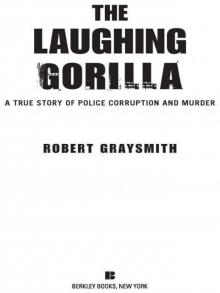 The Laughing Gorilla: A True Story of Police Corruption and Murder
The Laughing Gorilla: A True Story of Police Corruption and Murder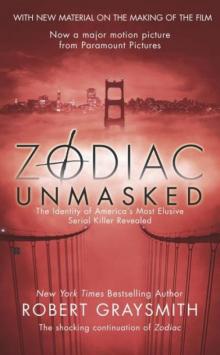 Zodiac Unmasked: The Identity of America's Most Elusive Serial Killer Revealed
Zodiac Unmasked: The Identity of America's Most Elusive Serial Killer Revealed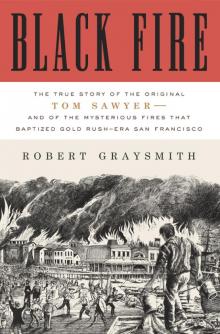 Black Fire: The True Story of the Original Tom Sawyer
Black Fire: The True Story of the Original Tom Sawyer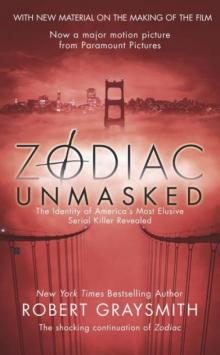 Zodiac Unmasked: The Identity of America's Most Elusive Serial Killers Revealed
Zodiac Unmasked: The Identity of America's Most Elusive Serial Killers Revealed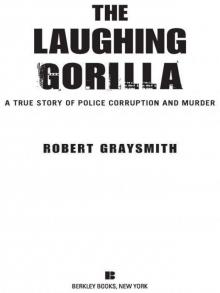 The Laughing Gorilla
The Laughing Gorilla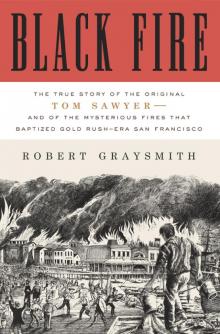 Black Fire
Black Fire